Response to Matt Gaspers of ‘Inside the Vatican’…
A Serious Accusation:
Is Novus Ordo Watch Being Deceptive?
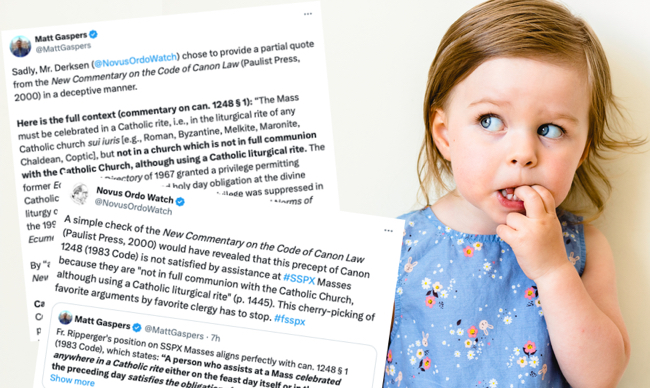
Here is the Evidence – YOU Decide!
[UPDATE: On Oct. 5, 2024, Mr. Matt Gaspers graciously apologized on Twitter and conceded that his interpretation of the New Commentary is likely incorrect. Of course we accept the apology.]
Sometimes sparks fly when people discuss matters of theology on social media, and that is not necessarily a bad thing. What ought not to happen during such skirmishes, however, is that one party rashly accuse the other of being dishonest about the issue under discussion.
Unfortunately, Mr. Matt Gaspers, until recently the managing editor of Catholic Family News and currently of Inside the Vatican, decided that he should add an (ostensibly documented) accusation of deception to a theological disagreement he was having with Novus Ordo Watch on the social media platform X, better known by its former name, Twitter.
In many cases, one could and should just let little accusations like that slide, given that they are often made off the cuff in the heat of an argument and with no lasting damage to the reputation of the accused. However, since Gaspers decided to publicize the matter further on Twitter, a proper response is in order since this matter concerns not simply the reputation of an individual (yours truly, Mr. Mario Derksen) but of an organization whose work and influence very much depends on the quality and integrity of its research and argumentation. To do nothing in response to Gaspers here would be to give the impression that his accusation of deliberate deception is justified.
What follows is therefore a clear rebuttal of the accusation that Novus Ordo Watch has engaged in deception. It is also an interesting exploration into the topic of whether, by Novus Ordo standards, assistance at SSPX Masses fulfills the Sunday obligation imposed by the Vatican II Church in its 1983 Code of Canon Law, as that is the issue concerning which Gaspers claims Novus Ordo Watch has been deceptive.
Why would we care if assistance at SSPX Masses fulfills the Sunday obligation by Novus Ordo standards? Because the recognize-and-resist traditionalists like Gaspers, and all SSPX adherents and sympathizers, claim that they are abiding by those standards; and indeed they would have to, considering that they insist the Novus Ordo hierarchy is the lawful Catholic hierarchy and that they are submitted to it, in contrast with us ‘schismatic’ sedevacantists. Thus we are interested in evaluating whether they are indeed measuring up to the standards they themselves claim to recognize and follow.
To be clear: By no means are we trying to suggest that the Vatican II Church has the power to legislate anything, nor that its 1983 Code of Canon Law is of any force or even of any relevance to real Catholics, nor that assistance at SSPX Masses is ever licit for sedevacantists. It is strictly for the sake of argument that we will, in what follows, enter into the recognize-and-resist traditionalists’ own theological world — in which Francis is Pope and the 1983 Code is the canon law of the Roman Catholic Church — because our goal is to critique their argumentation by their own standards and beliefs. In other words, we have to ‘play their game’ if we want to find out whether they are indeed playing by their own rules.
So, what happened?
Gaspers Touts Ripperger on SSPX Masses
On Sep. 23, 2024, Gaspers approvingly tweeted about ‘Father’ (why the quotes?) Chad Ripperger stating in a recent YouTube interview with Gene Zanetti that assistance at Masses offered by priests of the Lefebvrist Society of St. Pius X (SSPX or FSSPX) fulfills the Sunday obligation imposed by Canon 1248 §1 of the 1983 Code of Canon Law:
Frustrated by the common semi-traditionalist habit of touting (supposed) ecclesiastical authorities when they say something that agrees with their position, the present writer commented in response: “Fine, but let’s not pretend there aren’t a bazillion other ‘Catholic priests’ who would answer that question differently.”
The point was to show that, certainly, the Rev. Ripperger can give his take on whether assistance at SSPX Masses fulfills the Sunday obligation, but it’s not as if his opinion could settle the matter. Rather, Ripperger’s is just one opinion among many, and it may or may not be correct. Certainly, lots of Novus Ordo priests, including canon lawyers, would no doubt disagree with Ripperger’s assessment.
Selectively touting as authorities only those who agree with one’s position — and only because, and inasmuch as, they agree with one’s position — is a really bad habit that is ultimately intellectually dishonest. That is not to say that everyone who does it — and the present writer does not wish to pretend he hasn’t at times done the same thing in the past, mea culpa! — is therefore malicious or consciously trying to deceive. Rather, when one is filled with zeal for what one is convinced is a noble cause, it can easily happen that one succumbs to confirmation bias and eagerly puts forward all the evidence one can find in one’s favor while at the same time being negligent about admitting facts that actually go contrary to one’s position.
(This bad habit, by the way, is what underlies things like Taylor Marshall bringing Matt Gaspers on his show to ‘determine’ whether a Pope can outlaw the Traditional Latin Mass. Marshall chose Gaspers — as opposed to, say, a credentialed liturgical scholar or theology professor — precisely because Gaspers takes the position that a Pope cannot do such a thing, and that is the position Marshall wanted to see vindicated and broadcast.)
The Argument from Canon 1248 §1
On Sep. 25, in response to another Twitter user taking issue with Ripperger’s stance, Gaspers claimed that “Fr. Ripperger’s position on SSPX Masses aligns perfectly with can. 1248 § 1 (1983 Code)…”:
Indeed, appeal to Canon 1248 §1 has long been a favorite argument of the SSPX (here an example from 1998), since the plain wording of the canon would seem to work in the Lefebvrists’ favor:
Can. 1248 §1. A person who assists at a Mass celebrated anywhere in a Catholic rite either on the feast day itself or in the evening of the preceding day satisfies the obligation of participating in the Mass.
(Source)
On the face of it, it would indeed seem that, per the Code of Canon Law of 1983, attendance at an SSPX Mass fulfills the Sunday obligation of hearing Mass. However, when it comes to matters of theology and canon law, it always pays to ‘look it up’, as they say, and so that’s what the present writer did to see if Gaspers was justified in appealing to Novus Ordo canon law in defense of the SSPX.
It didn’t take much research to find out that the interpretation of this canon given by the Novus Ordo Canon Law Society of America is that only a Mass that is offered in “full communion” with Rome, as they like to call it (since Vatican II introduced the notion of “partial” communion in the 1960s), can fulfill the obligation imposed by Canon 1248 §1. That would mean that the Society of St. Pius X cannot appeal to this canon to argue its Masses fulfill the Sunday obligation, since they are not “in full communion” with the Vatican II Church.
Thus the present writer happily pointed out on Twitter…
…and followed up with:
The quote and screenshots shared in the above tweet are taken from New Commentary on the Code of Canon Law (#CommissionLink), edited by John P. Beal, James A. Coriden, and Thomas J. Green and published by Paulist Press in 2000. (It is called ‘New’ because an earlier edition had been published in 1985.) Unlike the Rev. Ripperger, all of the 36 contributors to that work “are members of the Canon Law Society of America and all hold doctoral degrees in canon law” (New Commentary, p. xix).
Let us look closely at the precise screenshot used in the tweet regarding Canon 1248 §1:
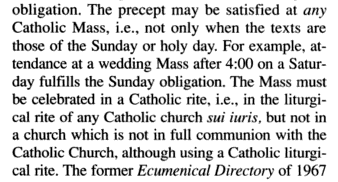
The operative sentence says: “The Mass must be celebrated in a Catholic rite, i.e., in the liturgical rite of any Catholic church sui iuris, but not in a church which is not in full communion with the Catholic Church, although using a Catholic liturgical rite.” (By “church sui iuris” the commentators are referring to the Latin [Roman] church and all of the Eastern churches in full communion with Rome, such as the Byzantine, Maronite, Mozarabic, etc.)
That’s a pretty clear statement, and one would think that Gaspers would at least acknowledge that this official commentary by the Canon Law Society of America does not share his reading of Canon 1248 §1. Certainly, one could argue that the SSPX does meet the criterion of being part of a church sui iuris — namely, the Latin (Roman) church –, but then whether or not they are indeed “in full communion” with that Roman church is precisely the question at issue. We will come back to this later.
The reason why the present writer told Gaspers in the tweet shown above, “This cherry-picking of favorite arguments by favorite clergy has to stop”, is because there is no reason why ‘Fr.’ Ripperger’s opinion on the matter should be considered authoritative all the while ignoring the opinion of actual canon lawyers, licensed and approved as such by the very people Gaspers & Co. insist constitute the lawful Roman Catholic hierarchy.
Gaspers Accuses Novus Ordo Watch
Alas, instead of acknowledging the legitimate alternate opinion on this matter from real (Novus Ordo) canon lawyers in the New Commentary, Gaspers decided to accuse Novus Ordo Watch of having tried to deceive people about this by supposedly “providing a partial quote in a deceptive manner”:
The Novus Ordo Watch response came swiftly:
Unfortunately, Gaspers did not react further on this particular thread.
Instead, he chose to double down, repeating his false accusation in a separate, more elaborate post for which he started a new thread on Twitter, with the obvious intent of spreading it to more people so as to cause maximum damage to the reputation of Novus Ordo Watch, whose “deceptive” argumentation he thought he was exposing:
Leaving aside for a minute Gaspers’ eagerness to accuse a disliked theological opponent of dishonesty, we must take issue also with the evidence and argument he offers: the supposed “full context” of the New Commentary and the statement by ‘Cardinal’ Edward Cassidy.
Rebutting Gaspers’ Accusation
What Gaspers calls the “full context” of the New Commentary‘s remarks on Canon 1248 §1 changes nothing. After stating the general principle that the Sunday obligation can only be fulfilled by attending Masses offered in a church “in full communion with the Catholic Church”, the New Commentary goes on to mention that in 1967 ‘Pope’ Paul VI (r. 1963-1978) granted the “privilege” that the Sunday obligation can be satisfied by assisting at the Mass of an Eastern schismatic church (we reported on this last year here). This “privilege” was revoked, arguably, with the promulgation in 1983 of this very canon, but certainly no later than 1993 with the promulgation of the so-called Directory for the Application of Principles and Norms on Ecumenism. (Both were published, we might add, with the full alleged “apostolic authority” of the false pope John Paul II [r. 1978-2005].)
Thus the New Commentary goes on to state immediately after the quote Novus Ordo Watch provided:
The former Ecumenical Directory of 1967 granted a privilege permitting Catholics to fulfill their Sunday and holy day obligation at the divine liturgy of a separated Eastern church. This privilege was suppressed in the 1993 Directory for the Application of the Principles and Norms on Ecumenism.
From this Gaspers erroneously concludes that when the canon lawyers of the New Commentary say that assisting at Mass at “a church which is not in full communion with the Catholic Church, although using a Catholic liturgical rite” does not satisfy the Sunday obligation, they are referring to “separated Eastern church[es]” only: “By ‘a church which is not in full communion with the Catholic Church,’ the New Commentary on the Code of Canon Law clearly means ‘a separated Eastern church'”, Gaspers asserts confidently.
It is this firm conviction on Gasper’s part — entirely mistaken, as we will see momentarily — that makes him say not simply that Novus Ordo Watch is wrong regarding the proper understanding of the canon, but downright deceptive: “Why did you attempt to hide the full context, Mr. Derksen?”, Gaspers asks accusingly.
In his separate, more substantial Twitter post in which he doubles down on his charge, Gaspers adds what he thinks is additional evidence for his claim that the New Commentary authors didn’t mean to lump the SSPX in with churches “not in full communion” with Rome:
Cardinal Edward Cassidy (d. 2021), former president of the Pontifical Council for the Promotion of Christian Unity, wrote in 1994: “I would point out at once that the Directory on Ecumenism is not concerned with the Society of Saint Pius X. The situation of the members of this Society is an internal matter of the Catholic Church. The Society is not another Church or Ecclesial Community in the meaning used in the Directory.”
Source: Protocol Number 2336/94/1, 3 May 1994, English translation in P. VERE, Canon 844 §2 Can a Catholic Approach an SSPX Priest for the Sacraments, Ottawa, St. Paul University, 1999, 18-19.
In short, SSPX priests do not form “a separated church.” They are Catholic priests who offer the Mass according to the liturgical rite of the particular Church to which they belong, namely, the Roman Church. Thus, their Masses meet the criteria specified in can. 1248 § 1 (1983 Code).
Thus Gaspers thinks he has scored a home run against Novus Ordo Watch.
 Before we continue, a quick aside on ‘cherry-picking’ is in order:
Before we continue, a quick aside on ‘cherry-picking’ is in order:
This quote by ‘Cardinal’ Cassidy is always trotted out when someone needs to defend the SSPX from the charge of schism. Although it is certainly one piece of relevant data that must definitely be taken into consideration, it could not possibly be used to settle the matter.
This is actually a perfect example of confirmation bias at work: Why is Cassidy’s pronouncement being treated as authoritative by the SSPX defender? Is it because it is an official statement from a man who was then in charge of the Vatican’s ecumenism department? Hardly, considering that semi-traditionalists don’t much care what the Vatican Modernists have to say especially on ecumenical matters, and in the final analysis they certainly don’t feel bound by their declarations per se.
Why, then, is Cassidy being quoted here as an authority on the status of the SSPX? Only because he said something that works in the SSPX’s favor. That is the primary reason. Had Cassidy said that the SSPX is a schismatic sect, Gaspers & Co. would simply have dismissed his pronouncement as the mad ravings of a Modernist that bind no one!
In truth, then, Cassidy is no authority at all for SSPX defenders. What’s authoritative for them is anything said that the SSPX can use in its defense. The ‘authority’ of ‘Cardinal’ Cassidy is only being implicitly invoked here as a convenient cudgel with which to whip the theological opponent.
Now, one might wonder why Gaspers would appeal to a 1994 statement from a Vatican ‘cardinal’ in the context of his ecumenical office’s Directory to explain what American canon lawyers writing in 2000 ‘must have meant’ when commenting on Canon 1248 §1.
Nevertheless, the evidence Gaspers brought into the mix is certainly fair game — at first sight perhaps one ought simply to accept the argument at face value and concede that the managing editor of Inside the Vatican just may be right in thinking the SSPX is not meant to be included among churches “not in full communion with Rome” by the canon law commentators in question after all.
Except that one can simply look up what the New Commentary says about the SSPX explicitly, and then all guesswork is removed.
And thus we turn to Canon 205 of the 1983 Code, which concerns itself precisely with the issue of “full communion” with Rome:
Can. 205 Those baptized are fully in the communion of the Catholic Church on this earth who are joined with Christ in its visible structure by the bonds of the profession of faith, the sacraments, and ecclesiastical governance.
(Source)
On page 250 of the New Commentary, where Canon 205 is discussed, the authors refer to a specific example of who is not in full communion on account of having severed the bond of governance, that is, on account of schism:
Canon 751 defines schism as “the refusal of submission to the Supreme Pontiff or of communion with the members of the Church subject to him.” One clear example of schism was the behavior of Archbishop Marcel Lefebvre, in particular his unlawful conferral of episcopal ordination on June 30, 1988, in the face of an explicit papal prohibition (see c. 1382). In his apostolic letter, Ecclesia Dei, Pope John Paul II described this ordination as constituting a schismatic act insofar as Archbishop Lefebvre’s disobedience implied a rejection of the Roman primacy; further, those individuals linked with Archbishop Lefebvre have severed the bonds of full communion with the Catholic Church.
(underlining added)
Here is the scan of the relevant portion of the book:
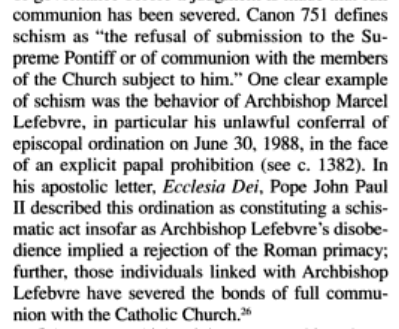
Lest we be accused again of “attempting to hide something”, footnote 26 simply refers to John Paul II’s ‘Apostolic Letter’ Ecclesia Dei of July 2, 1988, and points to the source for the English text in Origins. The paragraph that follows the one just quoted from, contrasts the Lefebvrist schism with cases that aren’t as clear-cut.
So here we see clearly that the New Commentary means to include the SSPX among those “not in full communion” with the Vatican. After all, who are the “individuals linked with Archbishop Lefebvre” if not the very members of the Society he founded and the people who actively unite themselves with them even in their sacred (liturgical) functions?
Now the question becomes, of course, why Gaspers didn’t bother to check what the New Commentary has to say about the SSPX directly, but we won’t speculate. He can answer the question himself if he wishes.
‘Full Communion’ since the Lifting of the Excommunications in 2009?
As we said, the New Commentary was issued in 2000, and a lot has happened since then. The most significant development with regard to the SSPX occurred in 2009, when ‘Pope’ Benedict XVI (r. 2005-2013) lifted the excommunications against the bishops consecrated by Abp. Lefebvre in 1988. Therefore, it is reasonble to ask whether the SSPX perhaps attained ‘full communion’ status when these excommunications were rescinded.
The answer is clearly in the negative.
For one thing, an excommunication is a medicinal penalty imposed on individuals, and it is independent of the question of schism. Strictly speaking, someone could be schismatic without being excommunicated, just as someone could be excommunicated without being (or thereby becoming) schismatic.
Exploring this further is not necessary, however, as we can simply look at what ‘Cardinal’ Giovanni Battista Re in his role as head of the Congregation for Bishops, stated in his decree remitting the excommunications by authority of Benedict XVI:
It is hoped that this step will be followed by the prompt attainment of full communion with the Church on the part of the whole Society of St Pius X, which will thus bear witness to its genuine fidelity and genuine recognition of the Magisterium and authority of the Pope by the proof of visible unity.
(Congregation for Bishops, Decree Remitting the Excommunication “Latae Sententiae” of the Bishops of the Society of St Pius X, Jan. 21, 2009)
Here ‘Cardinal’ Re makes clear that the remitting of the excommunications is merely the first step to what is hoped will result eventually in the attainment of “full communion with the Church”. Therefore, regardless of what ecumenism chief ‘Cardinal’ Cassidy might have said in 1994 concerning the Directory for the Application of Principles and Norms on Ecumenism, the Congregation for Bishops considered “the whole Society of St Pius X” as not yet having attained full communion as of 2009.
Thus it is beyond question that the removal of the excommunications against the SSPX did not put the Society in ‘full communion’ with Rome, a status they have still not attained even today, despite other concessions made by ‘Pope’ Francis in the meantime.
Final Thoughts
This will conclude our response to Gaspers’ rash and false accusation that yours truly meant to deceive the public about the argument from Canon 1248 §1 by “providing a partial quote in a deceptive manner”.
We will not attempt, by the way, to resolve the question whether assistance at an SSPX Mass fulfills the Sunday obligation in the New Church. For one thing, it simply doesn’t matter, since, on the one hand, the Vatican II Sect has no power to impose the obligation, and, on the other hand, the SSPX has no power to fulfill it.
Our argumentation here was only meant to clarify that simply appealing to the judgment of ‘Fr.’ Ripperger or one’s own reading of canon law — as if this settled the matter — is merely an instance of cherry-picking sources insofar as what they say can be used to support one’s predetermined position. The somewhat authoritative New Commentary on the Code of Canon Law clearly includes the SSPX among those not in “full communion” with Rome, and that alone is a strong argument — though by itself not definitive proof, of course — that Canon 1248 §1 cannot be invoked by the Lefebvrists.
Lastly, does the present writer think the managing editor of Inside the Vatican was himself being deliberately deceptive about any of this? Not at all. Rather, Gaspers’ research has simply proven faulty, which is probably due to confirmation bias; and perhaps the matter was aggravated by the temptation of an ostensible opportunity to ‘expose’ the ‘deception’ of a long-time theological opponent.
Wanting to see one’s own dearly-held position confirmed — more so than finding out the objective truth of an issue — is something any of us can easily fall into even while having good intentions. However, since Gaspers used his own error to rashly and unjustly accuse Novus Ordo Watch, in public, of being dishonest, this needed to be addressed and the record set straight.
Image sources: composite with elements from X (screenshots) and Shutterstock (riggleton) / Shutterstock (majivecka)
Licenses: fair use and paid / paid

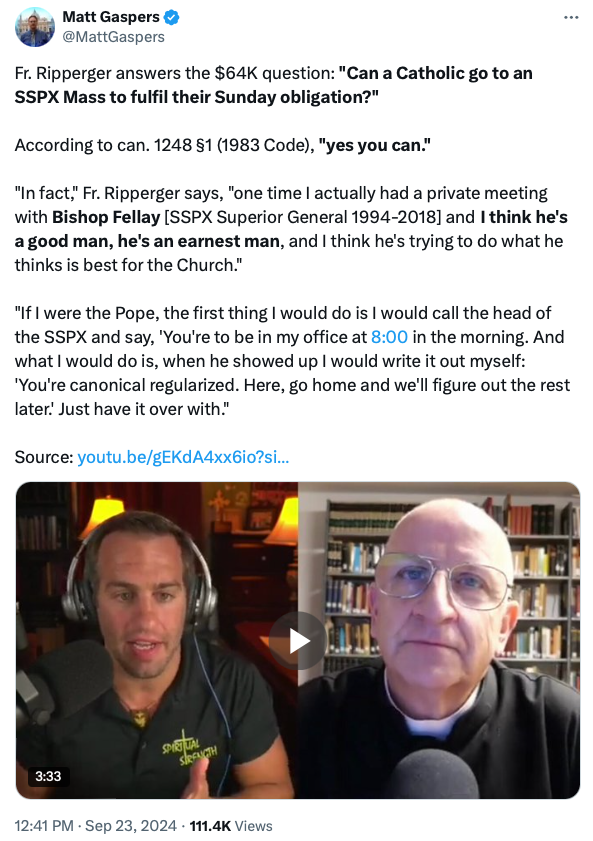
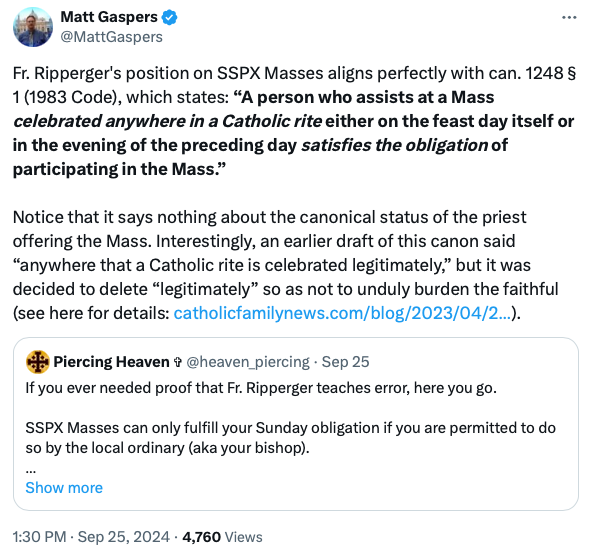 (
(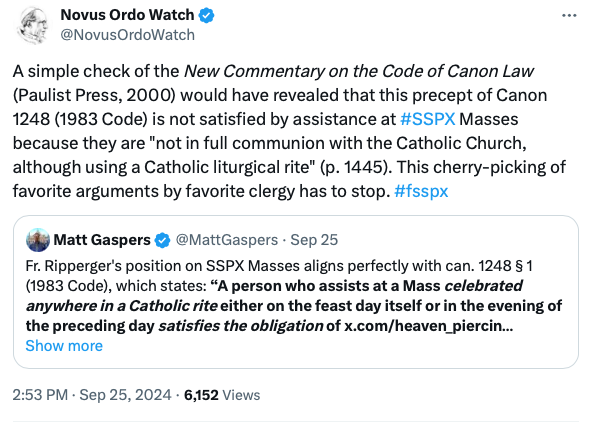 (
(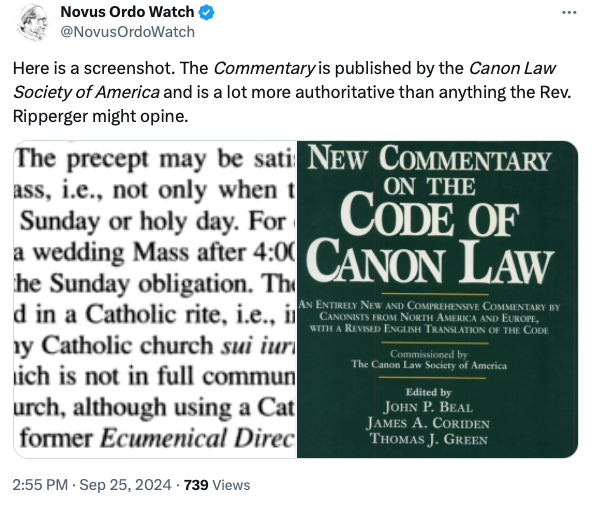 (
(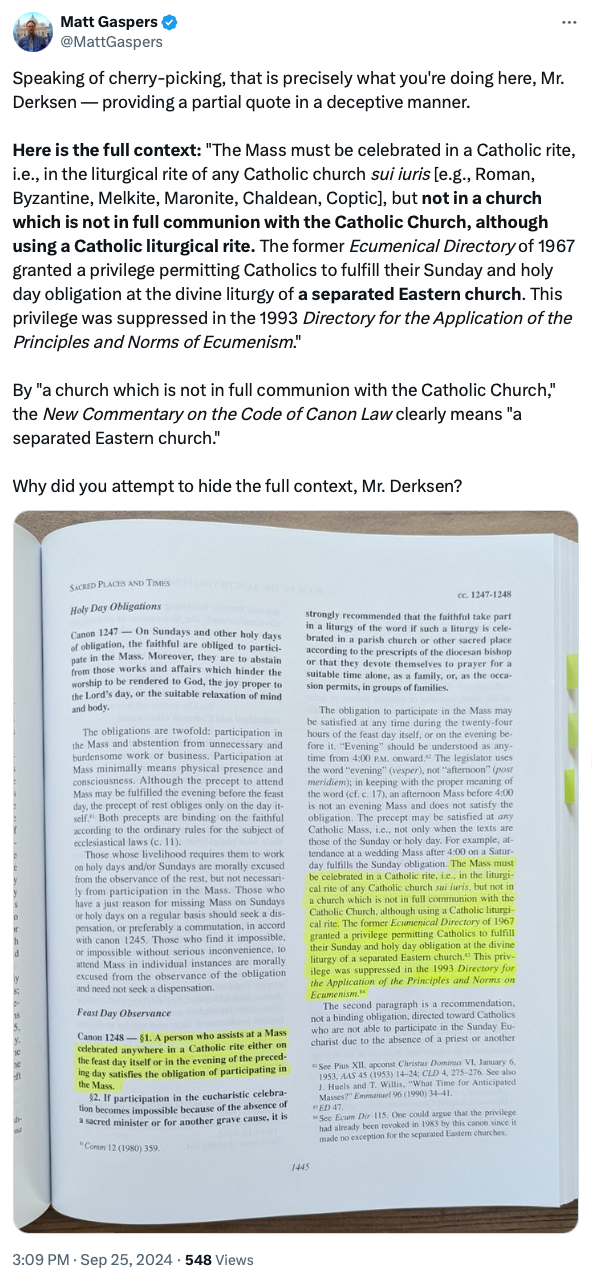 (
(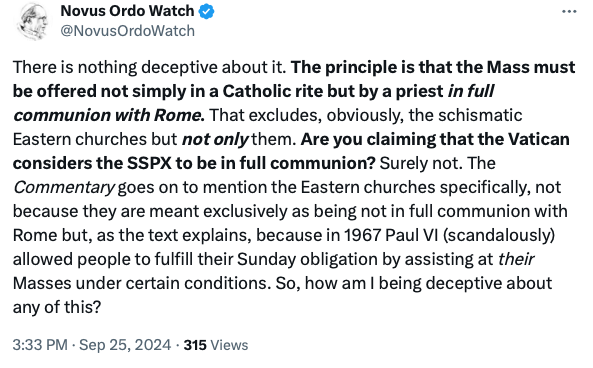 (
(


No Comments
Be the first to start a conversation